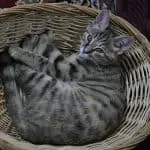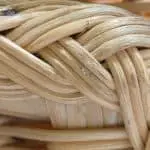
Wicker is one of the most common and attractive materials used for everyday household items and durable outdoor furniture.
It’s light, cheerful, relatively inexpensive, and anyone who owns a cat AND a wicker basket knows that Wicker attracts cats!
But does wicker attract bugs or are bugs attracted to wicker? Are your baskets and outdoor furniture a possible safe haven creepy-crawly pests?
Yes, certain bugs are attracted to wicker for a variety of different reasons. Still, the good news is that you can prevent infestation and keep them away from your precious wicker by understanding their patterns and taking a few logical steps.
Common Insects That Infest Wicker
Although you can find all kinds of creepy-crawlies in your wicker furniture for the outdoors or wicker baskets, there are two specific insects that simply love making their home in your valuable wicker.
Bostrichid Powderpost Beetles
These pesky insects love working their way into your wicker, causing tons of damage and grief for anyone unlucky enough to encounter them. Bostrichid Powderpost Beetles are wood-boring insects by nature, but they especially love wicker because of the woven design.
This design leaves the beetle plenty of space to lay eggs and start an infestation. Many people have been unpleasantly surprised to find their wicker baskets overcome with Bostrichid Powderpost Beetles and larvae.
They are relatively small, so you need to look closely to see if these little creatures have wormed their way into your wicker furniture for the outdoors or indoors, or other wicker products. If you find that your wicker baskets are overcome with beetles, you will need to wash them carefully with soap and water.
Spiders
Spiders are attracted to wicker for the same reason that Bostrichid Powderpost Beetles are: the woven design provides plenty of hiding spaces for them to burrow and set up nests. Since spiders need safe places for their delicate babies, wicker nooks and crannies make ideal havens.
Wicker is also an incredible environment for spiders to set up webs, as they can get plenty of footholds on the material and spin incredible designs. Ground predator spiders like the wolf, find that wicker that is on the ground a great hunting ground.
If you see one or two spider webs on your wicker furniture for the outdoors, watch out. There are probably plenty more spiders hiding just out of plain sight.
Why Do Wicker Baskets and Furniture Attract Bugs?
Wicker baskets and furniture attracts insects because of the design. Burrowing beetles and spiders like to hole up in the cracks and crevices of wicker furniture.

There’s another reason why insects prefer wicker, especially wicker furniture for the outdoors; it’s very difficult to clean properly. Unlike other outdoor furniture types, wicker is soft and contains plenty of ridges and tiny nooks that are extremely difficult to get into.
You need to gently wash your wicker with mild soap and water, paying attention to all of the small areas where pests can find a home. It’s tedious and time-consuming work, and plenty of people don’t want to put in the time or elbow grease to really do a good job. As such, there are certain areas of the furniture that aren’t cleaned very often, and these spots make great hiding spaces for insects.
If you decide to invest in wicker, be prepared to spend some time each season cleaning it. It’s time-consuming, but getting into the crevices with an old toothbrush is one sure-fire way to make it an inhospitable environment for Bostrichid Powderpost Beetles and spiders.
How Do I Protect My Wicker?
In addition to cleaning your wicker regularly and keeping a sharp eye out for pests, you can also seal it with a protectant. This glossy treatment actually does double duty: it keeps pests from actually burrowing into the wicker itself, and maintains the quality of the wood for multiple seasons. If your wicker is painted, a protectant can also work to seal in the color and keep it looking fresh.
Before you seal your wicker furniture for the outdoors or wicker baskets, make sure that you clean them thoroughly. Use a mixture of detergent and bleach to meticulously scrub the wicker and let it sit on the furniture if you notice that there are any signs of infestation or mildew. The bleach will kill the mildew and any pests inside.
Other Considerations for Keeping Wicker Pest-Free
Even if you use a protectant on your wicker, it’s still a good idea to clean it regularly. Although the protectant will stop insects from burrowing into the wood itself, there will always be small holes and crevices for spiders or other vermin to hide. Make sure that you clean your wicker weekly, and give it a deep and thorough cleaning every season.
You can also employ other methods for keeping your yard free of pests, like spraying around the perimeter of your patio or using citronella candles to keep some of the pests at bay. Ultimately, if you are sitting outside, you will be surrounded by nature and insects, but you can make your furniture less enticing to them.
If your wicker furniture for the outdoors has seat cushions, make sure that you are laundering them regularly. Insects love to burrow into the soft fabric of seat cushions, especially after it rains. Ensure that you are not sitting down on any creepy-crawlies by making a regular habit of washing and drying your outdoor seat cushions.
For the times inbetween, insert a dryer sheet between the cushion and the wicker. You can rest, and sit, easy!
Finally, most wicker furniture for the outdoors is seasonal. Don’t leave your precious wicker outside in the elements when the snow or rain comes. Take it inside and put it in a safe and secure location until it’s ready to be used for the following year.
Leaving wicker outside during the winter can cause a lot of wear and tear, even if the furniture is protected by a sealant. Don’t take a chance. You can have your furniture for years to come if you take care of it.
Summing it All Up
Ultimately, wicker does attract bugs because of its porous nature and design, but there are smart ways to counteract and prevent any infestations before they become too big to handle. By simply taking care of your wicker products through regular washing and maintenance, you can dissuade insects from making their homes in your furniture.
